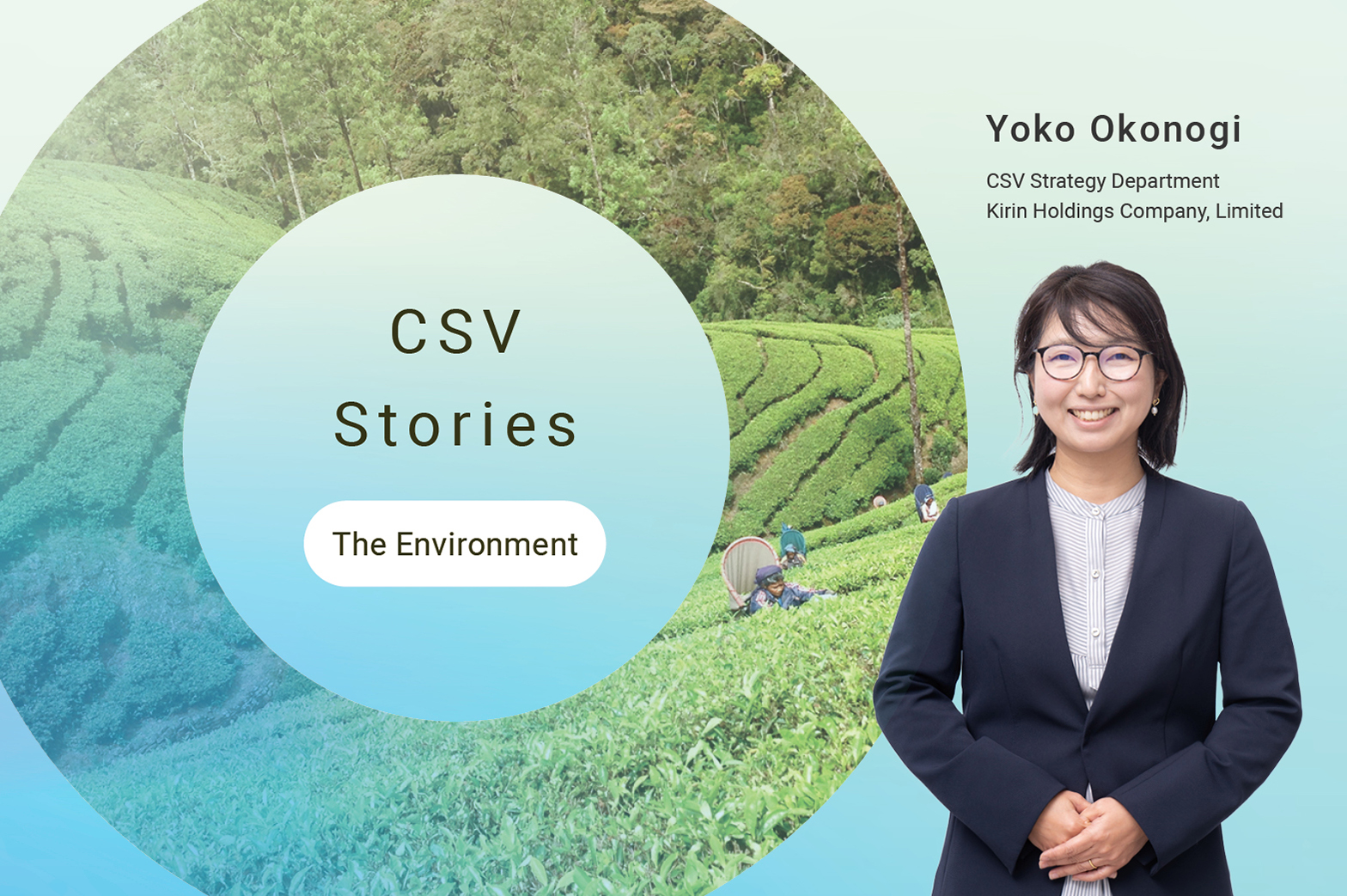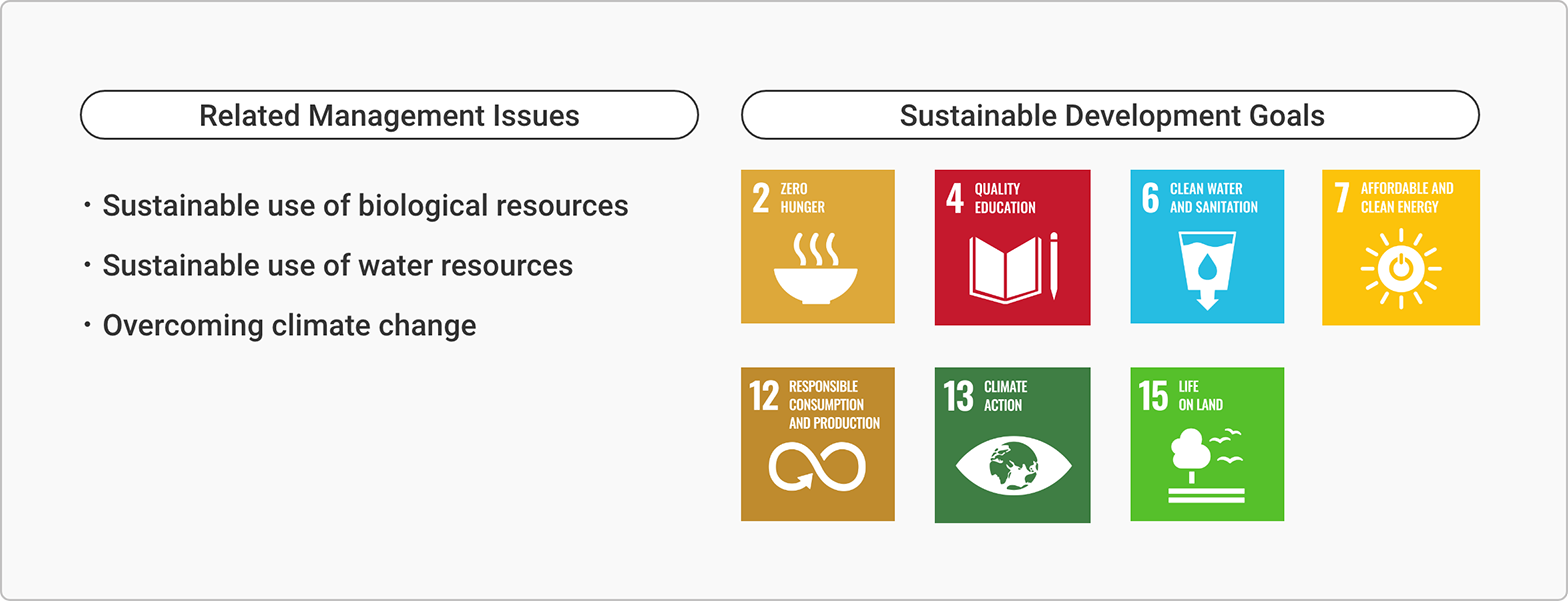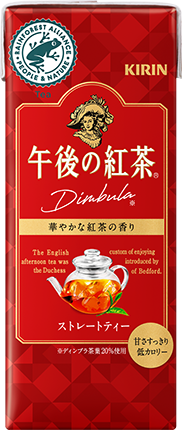Creating Positive Impact on Society through Active Engagement with Natural Capital


The Kirin Group aims to achieve sustainable growth by implementing the cycle of value creation, with CSV at the core of its business operations. One of the priority social issues we have identified is the environment. Kirin Group's Environmental Vision 2050, announced in 2020, aims to “Enrich the Earth with Positive Impact” and addresses four main issues: biological resources, water resources, containers and packaging, and climate change. We believe that these issues are interrelated and require a holistic approach.
The increasing importance of adopting a holistic approach to complex and interrelated environmental issues
Climate change affects global warming, shrinking daily temperature differences, and changes in rainfall, and will have consequences for natural capital*1 such as crops and water. Climate change and natural capital are interconnected, and it is essential to address and resolve them in a holistic manner.
On the other hand, there is a difference between these impacts. While greenhouse gases (GHGs) are dispersed into the atmosphere, resulting in global climate change regardless of where they are emitted, the impact on natural capital is location-specific. Altering land, for instance, can cause the loss of unique biodiversity that exists only in a particular place or river, and the consequences will vary from place to place. Addressing climate change requires global measures, whereas tackling natural capital demands understanding and addressing issues at a local level.
For over a decade, the Kirin Group has acknowledged the interrelatedness of environmental issues and the importance of a holistic approach, and has been conducting research to unveil the impact. This allowed us to quickly engage in TCFD*2 scenario analysis for climate change. In addition, we participated in The TNFD*3 Forum and disclosed information related to natural capital on a trial basis, based on the TNFD LEAP*4 Approach in July 2022.
*1:Natural capital is the stock of natural assets that provide society with flows of renewable and non-renewable resources and ecosystem services.
*2:TCFD, which stands for Task Force on Climate-related Financial Disclosures, was established by the Financial Stability Board (FSB) at the request of the G20 Finance Ministers and Central Bank Governors’ Meeting. Its purpose is to develop guidance to help organizations understand and disclose the financial implications of risks and opportunities posed by climate change.
*3:TNFD, which stands for Taskforce on Nature-related Financial Disclosures, was established to develop guidance for companies and other stakeholders to disclose nature-related risks and dependencies on nature. Its purpose is to redirect funding towards nature positive initiatives, with the goal of halting the decline of nature and setting it on a path to recovery by 2030.
*4:LEAP (Locate, Evaluate, Assess, Prepare) is TNFD’s recommended approach for assessing a company’s nature-related risks and opportunities
Natural capital is the foundation of the Kirin Group’s business
The Kirin Group has a brewing philosophy called “Reverence for Life.” It recognizes that the Group’s businesses—alcoholic and non-alcoholic beverages, and pharmaceuticals—rely on water and crops as raw materials of fermentation by microorganisms. We are in awe of the fact that they are made from life, which is why we humbly lean the science of life. As a company that operates with the blessings of nature, Kirin believes that its corporate culture is closely linked to its respect for the diversity of people and the natural environment. The loss of precious natural capital is a significant risk for the Kirin Group.
For instance, Kirin Gogo-no-Kocha has been using Sri Lankan black tea leaves since its launch, which we proudly feature in our marketing. Similarly, the grape varieties used to make Japanese wines, as specified by the Japanese Wine Labeling Standards, are a natural capital specific to certain regions where they are harvested. As many of our products are location-dependent, the inability to use locally-sourced ingredients could potentially harm the product concept and marketing strategies.
Next, there is a risk of divestment by ESG funds, a type of long-term investment essential for stable business continuation. In recent years, ESG investments have gained significant attention, and their proportion of total investments is increasing globally. The Kirin Group has been continuously disclosing TCFD scenario analysis since 2018 to identify diverse risks upstream in the value chain, particularly in agricultural raw materials and water resources, and to firmly address them. By doing so, we have built a solid foundation to receive continued support from long-term investors, and we can manage our business strategically and stably.
The financial impact of natural capital risk
From a financial standpoint, the cost impact of reduced crop yields (barley, hops, grapes, black tea leaves, etc.) due to climate change, under the 4°C scenario, is estimated to range from approximately 2.5 to 9.7 billion yen. The cost of shutdowns caused by floods and droughts cannot be ignored either, with floods costing approximately 1 to 5 billion yen, and droughts costing approximately 30 to 600 million yen.
The first in the world to disclose natural capital on a trial basis based on the TNFD’s "LEAP Approach".
In March 2022, the TNFD published the “LEAP Approach,” a framework for companies to understand and evaluate nature-related risks and opportunities, in the first beta version (v0.1) of the proposed disclosure framework for nature-related financial information. In response, we applied this approach to disclose information in the Kirin Group Environmental Report 2022, which was published in July of the same year. The TNDF stated that we were the first company in the world to do so.
We were able to disclose this information in a relatively short period of time, about four months, due to our prompt efforts in addressing natural capital issues based on our brewing philosophy of “Reverence for Life.” Our efforts began after the 10th Conference of the Parties (COP10) to the Convention on Biological Diversity held in Nagoya in 2010. Unlike many companies that focused on forestry and other activities, we chose agricultural raw materials and water as our target products based on our materiality analysis and began our full-scale efforts to address natural capital as an important activity for sustainable business continuity. In 2011, we conducted a risk survey and assessment of biological resources and, in 2013, announced the Kirin Group Action Plan for the Sustainable Use of Biological Resources. We established a policy of not using agricultural crops that could damage tropical rainforests and identified black tea leaves, paper, and palm oil as biological resources for which risks should be reduced. In 2021, we added coffee beans and soybeans to the list considering business and social issues after completing the aforementioned three initiatives.
With regard to agricultural raw materials, we have been supporting tea farmers in Sri Lanka to obtain Rainforest Alliance certification*5 since 2013. The certification training not only emphasizes the preservation of the ecosystem but also teaches the proper use of fertilizers and pesticides, and the planting of grasses that hold the soil together to prevent landslides and soil runoff during torrential rains caused by climate change. Every year, the Kirin Group representatives visit the area to build relationships of trust with tea estate managers and NGOs in charge of local training, as well as to understand local issues. The conservation of water sources within the tea plantations is one of the newly added activities. This February, Toru Yoshimura, CEO of Kirin Beverage, visited Sri Lanka.
We are also promoting the use of FSC®-certified paper in our paper containers to prevent the destruction of forests. These forests play a crucial role in absorbing and storing GHGs while also preserving biodiversity. In Japan, our beverage business has already achieved a 100% FSC-certified paper or recovered paper ratio for both paper containers and office paper, and we are working on expanding this initiative globally.
In addition, we have begun promoting the use of certified palm oil and supporting the acquisition of Rainforest Alliance certification for coffee beans in Vietnam.
Apart from that, we have been conducting an ecosystem survey at the Château Mercian Vineyard in collaboration with the National Agriculture and Food Research Organization (NARO). The transformation of idle and derelict land into a hedgerow and grass-cultivated vineyard has created a high-quality, extensive grassland environment that supports a diverse range of living creatures, and we are disseminating these findings to the public through academic papers and other publications.
With regard to water risks, various measures have also been implemented based on risk/stress surveys conducted at the Kirin Group’s global production sites. In Australia, where water stress is high, we have introduced advanced water treatment facilities with reverse osmosis membranes to prioritize water recycling, even if it increases energy consumption. Meanwhile, in Japan, where water stress is low, we have implemented water conservation measures that reuse and creatively save water, to the extent that energy consumption does not increase.
In an effort to mitigate climate change, we are implementing renewable energy sources and energy conservation practices in our plants. Our ultimate goal is to realize a “society that continuously recycles plastics” that contributes to a circular economy, while simultaneously reducing GHG emissions and minimizing the negative impact on natural capital.
In this way, the Kirin Group has been promoting initiatives to resolve issues to lead a sustainable use of natural capital and a decarbonized society, taking into consideration trends in the international community, environmental impacts, and business materiality.
*5:Rainforest Alliance certification is granted to farms that demonstrate their dedication to sustainable farming practices while prioritizing environmental protection and the well-being of farm workers.

Kirin Gogo-no-Kocha Straight Tea, 250 ml LL Slim, using tea leaves from farms certificated by Rainforest Alliance FSC®C137754
Sustainable use of natural capital through active engagement with the TNFD
The challenges posed by climate change and natural capital issues cannot be resolved by a single company; they must be tackled on a social level that expands beyond the boundaries of individual companies. Therefore, to ensure the sustainable use of natural capital, it is crucial to consider how companies, investors, and local communities are interconnected with, dependent on, and impacted by natural capital, in the same way as they are with climate change. TNFD provides the necessary framework to facilitate this consideration.
Unlike climate change, which has a straightforward measure in the form of GHG emissions, the challenge with natural capital lies in the fact that it cannot be measured by a single metric. To gain acceptance among diverse stakeholders as TCFD does and make the disclosure of natural capital information mainstream, it is necessary to provide as many examples as possible. By leading the way, the Kirin Group can serve as a reference for other companies, and the widespread adoption of TNFD can contribute to creating a positive impact on society and the environment.
Contributing to society by participating in the creation of a framework
The Kirin Group’s environmental management has been elevated through its adoption of excellent disclosure frameworks. The Kirin Group Long-Term Environmental Vision, announced in 2013, was formulated and disclosed as a vision for identifying material issues and resolving them in response to the disclosure of “risks and opportunities related to climate change” on the CDP questionnaire. The Kirin Group’s Environmental Vision 2050, announced in 2020, reflects the challenges identified through scenario analysis conducted in response to TCFD’s final recommendations that were disclosed in 2017.
Thus, by disclosing information through initiatives such as TCFD and CDP, the Kirin Group has gained a scientific understanding of its own risks and impacts and has been able to reflect and enhance this knowledge in its environmental management. The establishment of a shared framework for society has facilitated greater mutual understanding between investors and the company, while external evaluation and feedback have fostered a deeper internal understanding of the issues at hand.
However, the TCFD and CDP frameworks do not allow general companies to reflect their opinions within the frameworks, despite being required to disclose information. In contrast, the TNFD, which is currently under development, takes an open innovation approach by incorporating input from companies in the framework’s development. LEAP’s trial disclosure results are also fed back to the TNFD, and we aim to contribute to making the TNFD framework even better by continuously participating in various pilot programs.
Through our active involvement in TNFD, SBTs for Nature*6, TCFD, CDP, and other initiatives, we will continue to contribute to international rulemaking for better disclosure and the diffusion of rules and make a positive impact to enhance the sustainability of natural capital.
*6:A movement aimed at establishing science-based targets for the sustainable use of natural capital, similar to the SBT initiative which sets targets for addressing climate change.
Yoko Okonogi
CSV Strategy Department Kirin Holdings Company, Limited
Joined Kirin Holdings in 2021. She majored in natural environmental studies and ecology, and since joining the company, she has been focusing on enhancing the sustainability of the Kirin Group’s raw materials and biological resources. Furthermore, by participating in international rulemaking relating to natural capital, she aims to make the sustainable use of natural capital mainstream and create a positive impact.

*Stated information as at the date it is made